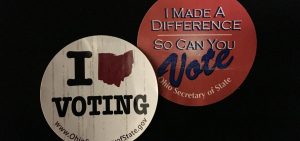News
Some lawmakers are again pushing to close Ohio’s primary elections
By: Sarah Donaldson | Statehouse News Bureau
Posted on:
COLUMBUS, Ohio (Statehouse News Bureau) — Republican state lawmakers have put out at least four different proposals to close Ohio’s partisan primary elections since the start of the legislative session last year.

“Our belief is this will help deter those who intend to manipulate the results of our primaries,” Rep. Beth Lear (R-Galena) said in her committee testimony. “Each party should have the right to determine their own candidates for general election without meddling from the outside.”
Right now, Ohio conducts partially open primaries—meaning voters in partisan elections don’t have to decide which side’s ballot they will cast until they submit their mail-in ballot application or arrive at the polls.
Secretary of State Frank LaRose, the state’s Republican chief elections official, also wants the system to shift away from that flexibility.
“We’re an outlier among states in the country that have a system like this,” LaRose said in an interview earlier this year. “I think that it would be better for us to have a system like what many other states, really most other states, have where you have to make that decision in advance.”
Ten states have closed primaries and 10 more have partly closed primaries, according to the National Conference of State Legislatures. Only three other states have systems like Ohio’s: Illinois, Indiana and Iowa.
But closed primary opponents, like House Minority Leader Allison Russo (D-Upper Arlington), argue changing the current system disenfranchises Ohioans.
“I’m opposed to any effort that would at all restrict voter access to the ballot. I look at closed primaries as just one more effort to restrict voters,” Russo said earlier this month.
Other closed primary iterations include Senate Bill 147, House Bill 208 and House Bill 210. The provisions laid out in these bills range, with longer and shorter time frames regulating when a person would need to be registered with a party to participate in the primaries.
Lear said she’d welcome the chance to work with any of the backers of those bills to get something to the finish line before December. So far, none of them have gotten a committee vote.

